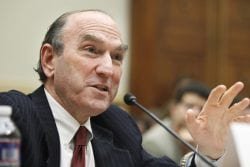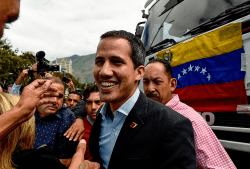Russia and China Thwart U.S. Efforts to Help Venezuelan People
Russia and China vetoed a popular resolution, intended to help the Venezuelan people, in a United Nations Security Council meeting on Thursday, according to a U.S. State Department official.

“There was a session of the UN Security Council yesterday on Venezuela. The United States presented a resolution that got the requisite nine votes for passage but was then vetoed by Russia and China,” Elliot Abrams, the lead State Department representative on Venezuela, told reporters Friday. “The Russians put in a resolution which got four votes, which I would call pathetic, and I think the results in the council demonstrate that there is very broad international support for democracy in Venezuela and for the National Assembly and Interim President Guaido.”
The resolution called for a free and fair presidential election in Venezuela and unhindered aid access.
Russia is sending wheat and medical supplies to Venezuela and Abrams said that the administration supports any efforts to aid the people, but that the U.S. would not stand by and let the aid be pilfered by Nicolas Maduro and his cronies for monetary gain or their own use.
While members of the Venezuelan military have prevented U.S. aid from entering the country, they might also defend the Russian shipments. The optics for the people of Venezuela would be that Maduro is still in control.
“Clearly, the support of Russia and China for the Maduro regime helps the regime,” Abrams said. “I don’t think you’re going to see large amounts of additional money put in by either Russia or China, but their political support, their diplomatic support helps the regime, and we have made the argument – unsuccessfully to date – to both Russia and China that they’re not helping themselves.”
Russia’s Foreign Minister Sergey Lavrov insists that U.S. involvement in Venezuela is intended to incite violence that ultimately requires America to intervene militarily.
“I have known Foreign Minister Lavrov for 15 years,” Abrams said. “I don’t think he actually believes that we’re attempting to do that, and I think, as you know, we are not attempting to do that. The United States is pursuing a policy of economic, financial, political, diplomatic pressure on the de facto regime in Venezuela in support of Juan Guaido, the interim president, the National Assembly, the Venezuelan people.”
“We continue to say and we always will that all options are on the table because they always are. But I think anyone who actually looks at American policy in Venezuela could not reach that conclusion,” he added.
The United States has also imposed new visa restrictions on individuals responsible for undermining Venezuela’s democracy.
“We are applying this policy to numerous Maduro-aligned officials and their families,” Abrams said. “Maduro supporters that abuse or violate human rights, steal from the Venezuelan people, or undermine Venezuela’s democracy are not welcome in the United States.”
“Neither are their family members who enjoy a privileged lifestyle at the expense of the liberty and prosperity of millions of Venezuelans,” he added.
The State Department would not specify an exact number of revoked visas, but said that it was “dozens more” than were in effect previous to Thursday’s action and they expect to find more.
The Treasury Department also announced additional sanctions Friday. The Trump administration took action against six security officials of the Maduro regime, individuals associated with the obstruction of the entry of international humanitarian aid into Venezuela or violence against those who attempted to deliver the assistance. Sanctions were imposed on Richard Jesus Lopez, commanding general of the Venezuelan National Guard; Jesus Maria Mantilla, commander of the Strategic Integral Defense Region Guayana; Alberto Mirtiliano Bermudez, division general for the Integral Defense Zone in Bolivar State; Jose Leonardo Norono, division general and commander for the Integral Defense Zone in Tachira State; Jose Miguel Dominguez, chief commissioner of the FAES, the special forces in Tachira; and Cristhiam Abelardo Morales, the national police director.
Concerns in the international community that Guaido’s stature is diminishing over time are unwarranted, according to Abrams.

“You saw Juan Guaido become much more of an international figure in the last week than he had previously been,” he said. “He’d not been very well known, but now he’s been meeting with a series of Latin American presidents, our Vice President.”
His presence “underlies it is the desire of the Venezuelan people to escape from the condition of dictatorship and economic misery that they are suffering, and that has not diminished and isn’t diminishing,” he added.
The answer to the first question is that we, I think and many other countries, are very concerned about Interim President Guaido’s ability to go back home, which he has a right to do as a Venezuelan citizen, and to go back home safely. Because a number of regime officials have actually threatened him with arrest. We certainly hope that he is able to go home safely. We know that there are dozens and dozens of other governments who share that concern. I think that if he were arrested on his return, you would see a very large reaction on the part of the Venezuelan people and on the part of the international community.
Content created by Conservative Daily News is available for re-publication without charge under the Creative Commons license. Visit our syndication page for details.




